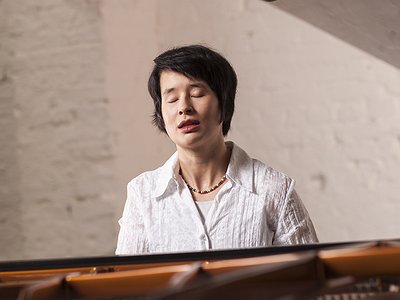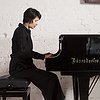Part 1
Name: Kimiko Ishizaka
Nationality: German-Japanese
Occupation: Pianist
Current Project: Recording Bach's Die Kunst der Fuge for license-free download
Recommendations: “An Equal Music” by Vikram Seth, in case you want to read a very believable account of the life of a classical musician, and “What I Talk About When I Talk About Running” by Haruki Murakami if you want to understand a little bit more about how I approach the piano.
Website / Contact: If you enjoyed this interview with Kimiko Ishizaka , keep up to date with her busy schedule via her website or facebook profile.
When did you start playing your instrument, and what or who were your early passions and influences? What what is about music and/or sound that drew you to it?
My mother started me at the age of 5 by putting my hands on the piano and pressing my fingers to push the keys. The first piece I learned was by Bach. It was such an integral part of our family life that I didn't really think about it – music was just what we did.
For most artists, originality is first preceded by a phase of learning and, often, emulating others. What was this like for you? How would you describe your own development as an artist and the transition towards your own voice? What is the the relationship between copying, learning and your own creativity?
Learning, definitely. Emulating others, not so much. In fact, to facilitate the greatest phase of learning that I've underwent, I stopped listening to recordings of piano playing altogether, and focused exclusively on what is in the scores. I am constantly searching for technical solutions to musical problems, and have thus redefined my piano playing several times in the past years. Learning, for me, is a matter of tireless experimentation, and ruthless criticism of the results. Even if it seems implausible, I will try a fingering or articulation, and really listen to the results in an effort to uncover something that works just a little bit better.
What were some of your main artistic challenges when starting out as an artist and in which way have they changed over the years?
When I began to approach Bach's works seriously, I didn't think it would be possible to actually play what he had written. I don't mean just playing all of the notes – that's not so hard. I mean playing a four voice fugue such that you can listen to any voice from start to finish, with its own soul and character, distinct from the other voices.
Realizing that the way to achieve that was to match articulations and phrasing to musical structure was the first breakthrough. Learning to look at Bach's music and actually see the structures properly was the next breakthrough. Putting it together so that I could play it all was a matter of thousands of hours of practice.
Tell us about your studio/work space, please. What were criteria when setting it up and how does this environment influence the creative process? How important, relatively speaking, are factors like mood, ergonomics, haptics and technology for you?
I work in a StudioBox which allows me to practice at any time of day or night. My piano is a Blüthner upright. I plan my day carefully around the time that I want to spend working, and everything has to fall into place to meet my goals. I consider sports part of my work, and I train vigorously 3-4 times a week with strength and endurance being the main goals. I train at home, so our living room looks a bit like an olympic gym.
Tell me about your instrument, please. What was your first instrument like and how did you progress to your current one? How would you describe the relationship with it? What are its most important qualities and how do they influence the musical results, including your own performance?
I bought the Blüthner at the age of 19 with cash that I had earned as a member of the Ishizaka Trio. I love it and don't ever want another instrument for my work. I can always imagine what it is going to sound like on a bigger instrument and have no problems transposing the sound that I get on the Blüthner to a Steinway or Bösendorfer. For me, I greatly value richness of sound and a 3-dimensional clarity (especially for Bach). I greatly dislike manufactured brilliance and avoid pianos that strive to be bright and shiny beyond what I ask of them.
Could you take us through a day in your life, from a possible morning routine through to your work? Do you have a fixed schedule? How do music and other aspects of your life feed back into each other - do you separate them or instead try to make them blend seamlessly?
I eat breakfast. I work out. I practice. I go outside to eat and walk. I watch a show on the couch with a glass of single malt scotch. I sleep (my least favorite part). It starts over again. I'm listening to Bach, in my mind, basically the whole time.
Could you describe your creative process on the basis of a piece or album that's particularly dear to you, please? Where did the ideas come from, how were they transformed in your mind, what did you start with and how do you refine these beginnings into the finished work of art?
When I prepare a work by Bach for performance or for a recording, it is an incredibly long investigation into the structure and meaning of the music. I can't bear to walk on stage unless I can explain to you, verbally or by playing, what the purpose of every note in the music is. I need you to know, if even intuitively, how every single sound fits with all of the others, and what Bach meant to express with it.
For this I have to study the work and investigate it for a very long time. That is why I will focus on one piece for many years at a time. I have been working on Die Kunst der Fuge now for well over three years in preparation for the recording and this concert tour.
The music will accompany me that entire time, whether I am in the practice room or not. When I'm eating breakfast, I'm listening to Bach in my mind. When I'm walking along the Rhein river at night, I am investigating themes, inversions, counterpoint, and articulations. The music chases me into bed where I really wish it would leave me alone, but in fact, it is there with me in my sleep as well. I suppose it's a form of method acting for pianists. In any case, it's total immersion into the work.






